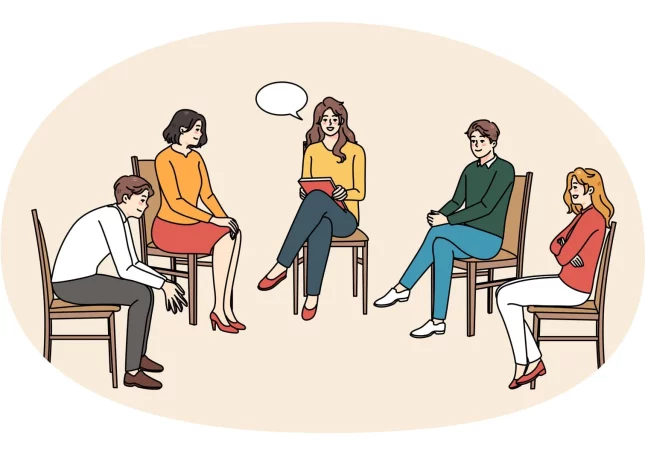
Group Therapy in NYC
Sometimes you just need to talk it out.
Learn how our Psychiatrist can help you.
What is group therapy?
Group therapy is a therapeutic approach that brings together a small group of individuals facing similar challenges, under the guidance of a trained therapist. Unlike individual therapy, group therapy provides a supportive environment where participants can share their experiences, insights, and emotions with others who can relate to their struggles. It offers a unique opportunity for personal growth, self-discovery, and emotional healing within a collective setting.
In group therapy, the group itself becomes an essential component of the therapeutic process. Participants interact, offer support, and provide different perspectives, creating a sense of community and shared understanding. This collaborative atmosphere fosters empathy, acceptance, and the opportunity to learn from others who may be on similar journeys.
The primary objective of group therapy is to offer a safe and confidential space where individuals can explore their thoughts, emotions, and behaviors. Through this process, they gain insights, develop coping strategies, and work toward personal growth and improved emotional well-being.

What does group therapy involve?
Group therapy typically involves regular meetings, with each session lasting approximately 60 to 90 minutes. During these sessions, participants engage in discussions and activities facilitated by a trained therapist. While the specific structure may vary based on the group’s focus and goals, several common elements are found in most group therapy settings:

- Group dynamics: Participants share their thoughts, feelings, and experiences while actively listening to others. Group members may offer support, feedback, and different perspectives on each other’s challenges.
- Trust and confidentiality: A fundamental aspect of group therapy is creating a safe and confidential environment where members can share openly without fear of judgment or breaches of privacy.
- Therapist guidance: The therapist guides discussions, ensures a balanced dialogue, and provides support and interventions as needed. They help participants explore their thoughts and emotions and offer coping strategies.
- Shared goals: Group therapy sessions often have specific goals or themes, such as managing anxiety, overcoming trauma, improving relationships, or enhancing self-esteem. The therapist and group members collaboratively work toward these goals.
- Skill-building: Participants learn practical skills, coping strategies, and techniques to manage their challenges and promote personal growth.
Benefits of group therapy:
- Shared support: Group therapy offers a sense of belonging and support from others who understand your experiences, reducing feelings of isolation.
- Diverse perspectives: Interacting with people from various backgrounds and perspectives provides a broader understanding of your challenges and potential solutions.
- Enhanced self-awareness: Hearing others share similar experiences can lead to increased self-awareness and personal insights.
- Improved coping strategies: Group members learn from each other’s coping strategies, fostering personal growth and resilience.
- Cost-effective: Group therapy is often more cost-effective than individual therapy, making mental health support more accessible.

WHAT WE ACHIEVED
Why Us
- Our practice is patient-centered and individualized to meet the needs of each of our patients
- Our patients' health and well-being are always our number 1 priority
- Our providers have multi-layered experience with various mental health challenges
PATIENTS SERVICED
YEARS IN BUSINESS

Who will benefit from group therapy?
Group therapy is a versatile and inclusive form of therapy that welcomes a diverse range of individuals grappling with various challenges. It serves as a valuable resource for those contending with mood disorders such as depression, anxiety, or bipolar disorder, offering a supportive space for emotional exploration.
Additionally, survivors of trauma or individuals with post-traumatic stress disorder (PTSD) find solace and healing within group settings. For those on the path to addiction recovery, group therapy provides essential peer support and strategies for maintaining sobriety.
Moreover, individuals seeking to enhance their interpersonal skills, address relationship complexities, manage stress, cope with grief, or foster personal development can all benefit from the dynamic and collaborative environment that group therapy offers.
Testimonials
Choosing GoodHealth for group therapy
GoodHealth is your trusted partner in group therapy, offering a supportive and collaborative environment where individuals can find healing, personal growth, and connection. Our experienced therapists facilitate groups that focus on a wide range of mental health and well-being topics, ensuring that you have access to the support and resources you need.
We are committed to evidence-based practices, creating a structured and empowering space for individuals to explore their challenges, build resilience, and work toward their goals. With flexible scheduling and a focus on your unique needs, GoodHealth is dedicated to helping you find a sense of community, belonging, and personal growth through group therapy.
Don't hesitate to contact us
Have any questions?
Please complete the form below and we will get right back to you.











